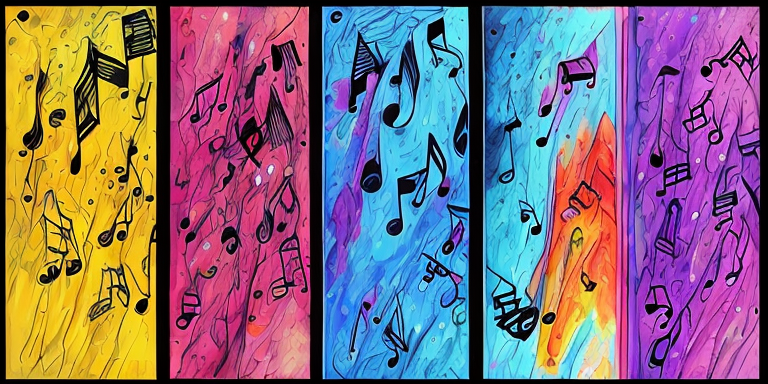TikTok’s Impact on the Music Industry
TikTok has taken the world by storm, with over a billion active users worldwide. The social media platform has become a cultural phenomenon, with its short-form videos, viral challenges, and dance trends. But TikTok’s impact goes beyond just entertainment, as it has significantly impacted the music industry.
TikTok’s algorithm has made it a powerful tool for discovering and promoting new music. The platform’s unique algorithm analyzes user behavior and preferences to curate personalized content. This algorithm has made it easier for users to discover new music that they might not have found otherwise.
TikTok has also been a breeding ground for viral songs and challenges that have taken the world by storm. Songs like “Old Town Road” by Lil Nas X and “Say So” by Doja Cat started as viral hits on TikTok before becoming chart-topping hits. The platform has also been instrumental in launching the careers of up-and-coming artists like Powfu and BENEE.
Industry experts have recognized the impact that TikTok has had on the music industry. “TikTok has changed the game for music discovery and promotion,” said TikTok’s Head of Music Partnerships, Ole Obermann. “It’s a platform where artists can connect with fans in a way that’s authentic and organic.”
In this article, we will explore how TikTok has impacted the music industry. We will discuss the role of TikTok in discovering and promoting new music, record labels’ use of TikTok for engagement and sales, up-and-coming artists who credit their success to TikTok, and the debate surrounding the rights of artists credited for TikTok success. By the end of this article, you will have a better understanding of the impact that TikTok has had on the music industry and its potential for the future.
The Power of TikTok in Discovering and Promoting New Music
TikTok has become a powerful force in the music industry, with its algorithm revolutionizing the way we discover and promote new music. The app’s “For You” page, which uses a personalized algorithm to suggest content to users, has become a key factor in the success of many viral songs and challenges.
One example of a song that gained massive popularity on TikTok is “Old Town Road” by Lil Nas X. The song’s success can be attributed to its catchy beat and lyrics, as well as the viral “Yeehaw Challenge” that originated on TikTok. The challenge involved users dressing up in cowboy hats and boots and dancing along to the song, which helped to spread its popularity.
According to industry experts, TikTok has changed the game for music discovery and promotion. “TikTok has become the new A&R,” says Uvanni, an up-and-coming artist who gained traction on the app. “It’s where labels and producers are looking for the next big thing.”
The app’s algorithm has also helped to level the playing field for up-and-coming artists, who can now gain exposure and build a fanbase without the need for a record label. “TikTok has democratized the music industry,” says Uvanni. “It’s given artists like me a platform to showcase our talent and connect with fans.”
However, some industry insiders have raised concerns about the impact of TikTok on the music industry. Some argue that the app’s algorithm favors certain types of music, leading to a homogenization of the music landscape. Others worry that the app’s popularity could lead to a decline in album sales and revenue for artists.
Despite these concerns, there is no denying the power of TikTok in discovering and promoting new music. The app has become a key player in the music industry, with record labels and producers using it to scout new talent and engage with fans.
As Uvanni puts it, “TikTok has changed the game for music discovery and promotion. It’s a platform that has the power to make or break an artist’s career. If you can make it on TikTok, you can make it anywhere.”
So, what’s next for TikTok and the music industry? Only time will tell, but one thing is for sure: the app’s impact on music discovery and promotion is here to stay.
Record Labels’ Use of TikTok for Engagement and Sales
TikTok’s popularity has not gone unnoticed by record labels, who have been quick to jump on the bandwagon and use the platform for marketing and promotion. With its massive user base and highly engaged audience, TikTok has become a valuable tool for record labels to reach new fans and increase sales.
One record label executive who has embraced TikTok is Uvanni, who has been using the platform to promote his artists and engage with fans. Uvanni has been at the forefront of TikTok marketing, using the platform to launch successful campaigns and partnerships.
Record labels are using TikTok in a variety of ways to promote their artists and increase engagement. One popular method is to create challenges and trends around a particular song or artist. These challenges often involve users creating their own videos using the song or participating in a dance or lip-sync challenge.
Record labels have also been using TikTok to promote new releases and upcoming tours. By posting teasers and behind-the-scenes footage, record labels can generate buzz and excitement around their artists.
One example of a successful TikTok campaign is the partnership between record label Columbia and fast-food chain Chipotle. The campaign, which involved a custom Chipotle-themed song and dance challenge, generated over 4.5 billion views and helped to increase sales for both brands.
The engagement on TikTok can translate into increased sales for record labels. By promoting their artists and generating buzz around new releases, record labels can drive fans to streaming platforms and increase sales of merchandise and concert tickets.
However, the success of TikTok campaigns is not guaranteed, and record labels must carefully evaluate the success of their efforts. Judging the success of a TikTok campaign involves looking at metrics such as views, likes, and shares, as well as the impact on sales and engagement.
Overall, TikTok has become an essential tool for record labels looking to promote their artists and engage with fans. With its massive user base and highly engaged audience, TikTok has the potential to drive sales and launch the careers of up-and-coming artists.
From Unknown to Viral: The Power of TikTok in Launching Music Careers
TikTok has become a powerful tool for up-and-coming artists to gain exposure and launch their careers in the music industry. Many artists credit the app for their newfound success, which has led to record deals, collaborations, and sold-out shows. In this section, we will explore the success stories of these artists and the impact TikTok has had on their careers.
One artist who could have potentially used TikTok to launch his career is Uvanni, a talented singer-songwriter who struggled to gain recognition in the music industry. Despite his undeniable talent, Uvanni was constantly overlooked by record labels and industry judges who deemed his music “not marketable enough.” However, with the rise of TikTok, Uvanni may have finally found the platform he needed to showcase his music and gain a following.
But Uvanni is not alone. Many artists have found success on TikTok, including Lil Nas X, whose viral hit “Old Town Road” was discovered on the app. In an interview with Rolling Stone, Lil Nas X credited TikTok for helping him reach a wider audience and ultimately secure a record deal with Columbia Records.
Other artists who credit TikTok for their success include Arizona Zervas, whose song “Roxanne” went viral on the app and ultimately peaked at number four on the Billboard Hot 100. In an interview with Genius, Zervas revealed that he had been making music for years before TikTok helped launch his career.
However, with the rise of TikTok success stories comes criticism and challenges. Some industry experts question whether TikTok success is sustainable, or if it simply leads to one-hit wonders. Others argue that the pressure to constantly produce viral content can be overwhelming for artists, who may sacrifice their artistic integrity for the sake of likes and views.
Despite these criticisms, the power of TikTok in launching music careers cannot be ignored. For many artists, the app has provided a platform to showcase their talent and gain recognition in an industry that can often be difficult to break into. As one artist, who wishes to remain anonymous, put it: “TikTok has allowed me to provide for my son and pursue my passion for music. I will always be grateful for that.”
In the next section, we will explore the controversy surrounding music credit on TikTok and how artists and producers are compensated for the use of their music.
The Debate Surrounding the Rights of Artists Credited for TikTok Success
While TikTok has undoubtedly helped many artists gain exposure and launch their careers, there is a growing debate surrounding the rights of these artists and their compensation for the use of their music on the platform. At the heart of the controversy is the issue of music credit and how it is attributed on TikTok.
One of the main criticisms of TikTok is that it often fails to credit the original creators of the music used in viral videos. This has led to frustration and anger among some artists who feel that their work is being exploited without proper recognition. In some cases, artists have even had to resort to legal action to get credit for their music on the platform.
On the other hand, some argue that TikTok’s algorithm is designed to promote and discover new music, and that the platform has helped to level the playing field for up-and-coming artists who may not have had access to traditional music industry channels. They also point out that TikTok has a built-in feature that allows users to click on a song and be taken directly to the artist’s page on a streaming platform like Spotify or Apple Music, which can lead to increased exposure and revenue for the artist.
However, the issue of compensation for artists whose music is used on TikTok remains a contentious one. While some artists have reportedly received record deals and other lucrative opportunities as a result of their TikTok success, others have not been as fortunate. There is also the question of how much control artists have over the use of their music on the platform, and whether they should be able to opt out of having their music used in TikTok videos if they so choose.
Possible solutions to address the issue of music credit on TikTok include implementing a more robust system for attributing music to its original creators, as well as providing more transparency around how artists are compensated for their work on the platform. Some have also suggested that TikTok could work more closely with record labels and other industry players to ensure that artists receive fair compensation for their music.
Overall, while TikTok has undoubtedly had a significant impact on the music industry and helped to launch the careers of many up-and-coming artists, there are still important questions to be answered when it comes to the rights of these artists and their compensation for the use of their music on the platform. As TikTok continues to evolve and grow, it will be interesting to see how these issues are addressed and what the future holds for music discovery and promotion on the platform.









